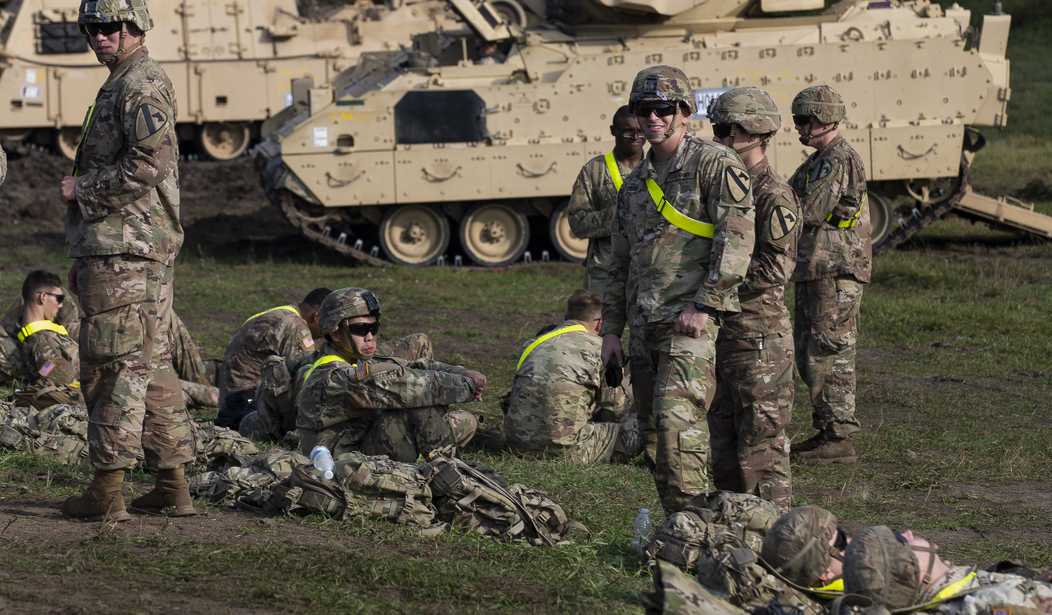America’s military might be shrinking in size soon if something doesn’t change. A recent report suggested that the Armed Forces is having trouble gaining new recruits. “All of the military services, except for the tiny Space Force, are at risk of failing to meet their recruiting goals for this year,” according to the Washington Examiner’s Jamie McIntyre.
The author spoke with several members of the Armed Forces and other experts who laid out the problems they are facing when it comes to attracting new soldiers. Retired Army Lt. Gen. Thomas Spoehr, who heads the Heritage Foundation’s Center for National Defense, told the news outlet that he believes this is a “systemic, long-term recruiting drought that is not going to ameliorate anytime soon.”
He added: “People I talk to say this year is bad, 2023 is going to be worse, and there’s no saying that 2024 is not going to be worse still.”
The Army is faring the worst of the branches of the military – it announced it would be forced to downsize its active-duty force by 12,000 soldiers this year. The issue is the 3.6 percent unemployment rate and the fact that recruiters were prevented from visiting high schools due to the COVID-19 pandemic. This is where they tend to get most of their new recruits.
Several factors are contributing to the military’s difficulty in attracting enough talent. McIntyre writes:
More young people are going directly to college out of high school, fewer come from families where military service is a tradition, and a decreasing percentage of the target age range can’t meet the physical fitness requirements or pass the background check for mental health issues or criminal offenses.
Another issue is the fact that Americans have lost trust in most of the country’s institutions, including the military. A recent Gallup poll showed that between 2021 and 2022, confidence in the Armed Forces dropped from 69 percent to 64 percent. McIntyre also noted:
A poll released by the Ronald Reagan Presidential Foundation in November found a dramatic decline in the number of people who said they have a great deal of trust and confidence in the military, down from 70% three years ago to just 45%.
Spoehr surmised that much of the issue is the politicization of the military, with people from both sides of the divide viewing it differently:
“A lot of people believe the military is either woke and it’s being pursued as a social experiment or that it’s a racist, extremist breeding ground. The middle ground, which the American military has enjoyed for almost all of its existence, as not being viewed as part of the political dimension, is eroding.”
Another contributor to the problem could be the fact that younger generations, including millennials and Gen Z, have been indoctrinated into progressive ideology, which suggests that America, at its core, is racist, sexist, and otherwise bigoted. These younger folks are essentially being taught that the U.S. is a nation that purposefully oppresses marginalized groups.
A recent poll showed that among people between the ages of 18 and 24, a measly 36 percent said they were either “extremely” or “very” proud to be an American. These findings are disturbing but not surprising. Why would anyone want to don the uniform of a nation they believe to be inherently evil and oppressive?
Those interested in this issue are having trouble coming up with a solution to the problem. Nobody is suggesting reinstituting the draft as that would be widely unpopular with the public. Spoehr suggested rebranding the military and exposing young folks to the Armed Forces at a younger age. Addressing misconceptions held by many among Gen Z could also be a remedy. McIntyre noted:
Nearly a third of Gen Zers believe most Army jobs involve direct combat — they don’t — and almost half don’t think the Army allows time for recreation and hobbies — it does. Most were unaware of education benefits that provide full college tuition, homebuying assistance, free healthcare, parental leave, and early retirement after 20 years.
With the indoctrination of young Americans and the ongoing effort to wokify the U.S. military, it is not easy to be optimistic about this situation. But all hope isn’t lost. If Republicans manage to retake the White House in 2024 with an actual conservative, they could start the process of reversing the damage the hard left has done.













